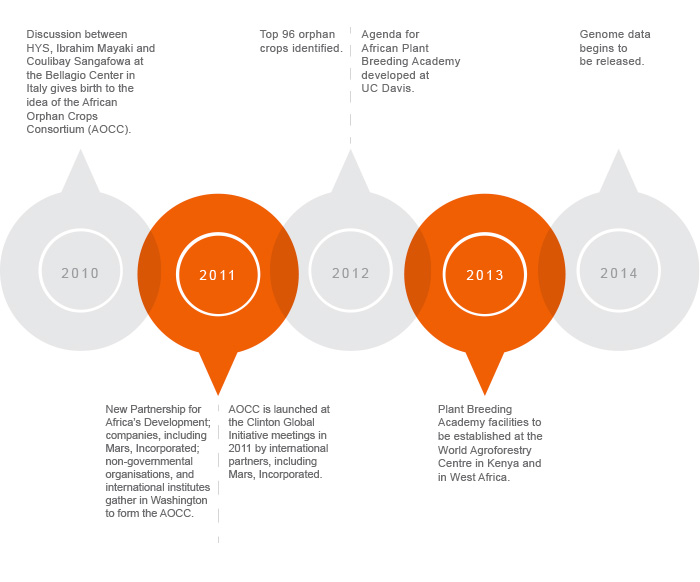The African Orphan Crops Consortium (AOCC) is an international effort to improve the nutrition, productivity and climatic adaptability of some of Africa’s most important food crops, helping to decrease the malnutrition and stunting rife among the continent’s rural children.
The goal is to sequence, assemble and annotate the genomes of 100 traditional African food crops, which will enable higher nutritional content for society over the decades to come. The resulting information will be put into the public domain, with the endorsement of the African Union.
These "Orphan Crops" are species that have been neglected by researchers and industry because they are not economically important on the global market.
Mars Inc. previously led a similar collaboration that sequenced, assembled and annotated the cacao (cocoa) genome and made these data publically available on the Internet to all researchers in 2010.
Who are the AOCC?
The African Orphan Crops Consortium includes:
- The African Union - New Partnership for Africa’s Development
- Mars, Incorporated
- Biosearch Technologies (Plant sampling kits, DNA extraction and KASP genotyping chemistry)
- World Agroforestry Centre
- BGI (doing the initial sequencing)
- Life Technologies Corporation (donor of sequencing equipment)
- World Wildlife Fund
- University of California, Davis
- iPlant Collaborative (managing the data produced)
- Biosciences eastern and central Africa - International Livestock Research Institute.
The AOCC invites communities focusing on the development of orphan crops to collaborate with the consortium on improving the productivity and nutrition of these crops.
More information on such collaborative opportunities is available from Howard Shapiro, chief agricultural officer at Mars Inc. and a senior fellow in the UC Davis Department of Plant Sciences and Allen Van Deynze, director of research at UC Davis' Seed Biotechnology Center.
If you are an AOCC member, please visit our how to start your extraction and genotyping project page.
AOCC timeline
